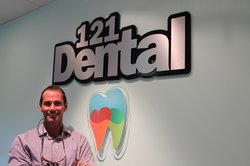
 Rolf Mann
Rolf Mann Technical guru Rolf Mann explains why properly installed equipment works better and lasts longer.
By Danny Chan
Frequently occurring – and problematic – technical issues mostly result from shoddy installation work rather than equipment malfunction, says Rolf Mann. The veteran equipment technician believes that unbeknownst to most dental practitioners, the majority of equipment complaints and breakdowns could easily have been pre-empted by a knowledgeable technician from the onset.
“Many dentists in Australia are under-informed about the long term problems associated with a badly installed equipment and plant room, and this is the case, regardless of brand or make. I would say that most of the factors contributing to the long-term performance of a dental equipment begin in the plant room.”
With 40 years experience in the dental industry, Rolf certainly knows what he’s talking about. The technical consultant to major brand manufacturers and distributors has looked under the hood of thousands of dental equipment, troubleshooting and rectifying a vast array of equipment types and models.
He has given training lectures on equipment installations in Sydney and Brisbane. Outside Australia, he has worked with Kavo Dental Asia-Pacific in Singapore, at its technical headquarters serving the Southeast Asian region. In recent years, Rolf’s expertise has particularly benefitted dental practices in North Queensland, where he is based both as a technical consultant and independent reseller for Ampac Dental.
“Very serious” about installations
Ampac Dental is an NSW-based importer of equipment for the dental and medical trades in Australia and New Zealand. The company boasts an extensive range of premium quality large and small dental supplies as well as equipment, including: Dental chairs, dental units, handpieces, surgical instruments, autoclaves, digital x-rays, alginate mixers, ultrasonic cleaners, curing lights, suction motors and compressors.
More importantly for its customers, at least in Rolf’s estimation, Ampac Dental is one of few companies out there that takes equipment installation work “very seriously”. And that is a credential he fears may be under-appreciated, although concedes it is gaining momentum as more dentists are exposed to the technical side of the business.
“Proper equipment installation encompasses everything from using good quality material for the connections and pipelines to a well-designed layout of the plant room. Many dentists are very laidback when it comes to important stuff like that yet they spend a lot of time fussing over the latest gimmicky feature of their dental unit.
“They should be doing the reverse. If you get the basics right at the installation stage, even a lesser known brand will perform better and serve you longer.”
The proper setting up of the plant room, Rolf informs, is in support terms, “absolutely critical” to the long-term reliability of the dental chairs. For instance, he says that making sure your dental unit is supplied clean water as well as compressed air that is free from oil and condensation alone guards it against 90 per cent of failures.
As well as being insidious to the well-being of the patient, Rolf warns that a contaminated dental waterline is damaging to the health of the equipment. He recommends a three-stage filtration system to reduce sediments and contaminants which the experienced technician qualifies would greatly prevent corrosion of the unit, stemming future problems like blockages and bacteria growth.
“Over the last 40 years, I have been installing systems that filter down to .5 microns. The first incoming filter cartridge filters the water supply to one micron, while the second is a carbon activated filter impregnated with silver, that effectively blocks bacteria. The third filter prevents any bleedoff from the second filter. Together they provide trouble-free performance.”
Mind-blowingly simple
Rolf reveals that such tested rigors, employed by all Ampac Dental technicians, are the real reasons why the company’s equipment remain in excellent working condition many years after their initial installation – a phenomenon attested to by their high customer referral business.
One such customer is Dr Damien Drew of 121 Dental Centre. January last year, Ampac Dental installed new equipment – two Swident dental units and the Progeny X-ray equipment – in the family clinic located in Cannonvale QLD. Impressed with Ampac’s “fantastic backup service”, Damien has ordered two more chairs and other equipment for his new practice, Main Street Dental due open in Proserpine, which is located just minutes from Cannonvale.
Says Dr Drew: “We’re really happy with the chairs. From the intuitive programs to the smooth movement, small footprint and ergonomics, the Swident chairs have been an absolute delight to work with.”
The chairs have been an increasingly popular mainstay in Ampac’s showrooms since (please insert year they were first imported). Rolf remembers his first brush with the relatively unknown dental chairs, when he accompanied the import firm’s owner Moe (Please insert Moe’s last name), on a sourcing trip to the Swident factory in Bologna, Italy.
He recalls: “We were both blown away by the simplistic quality of the chair designs. From a technician’s point of view, it was a pleasant surprise to learn that the Swident dental unit got rid of many design flaws that continue to plague today’s so-called branded models.”
Satisfied that the chair “hasn’t got gimmicky functions that noone uses anyway”, he provides the following example:
“The people at Swident went back to basics using an ordinary solenoid valve with manual controls for the water – you adjust it once and you never have to touch it again.
“Of all the issues I face servicing dental units, the biggest callout problem I get is with proportional valves. The Swident chairs doesn’t have that electronic valve so you already save on a lot of needless hassle. In our business, we apply the KISS principle: “Keep It Simple Stupid!””
Besides glowing feedback for the Swident chairs, Dr Drew has nothing but praise for the Ampac team – including the technican who helped install them:
“Both Moe and Elizabeth (Bozinovska) delivered without compromise in every aspect, in terms of product, goodwill and service.
“Rolf is very knowedgeable and goes out of his way for the customer. He is very experienced and meticulous; able to pre-empt all the plumbing and cabling issues with a carefully thought out plan – and he talks you through it as well.”
What not to do
Beyond customer praise, Rolf’s insistence on quality installations has also earned a steady stream of business – he keeps a full work schedule despite not having placed a single advertisement in the last 20 years. “I do not profess to know everything and nobody should,” says the 73-year-old stalwart, adding:
“It’s sometimes more important to know what not to do, especially that which will cause you problems in the future.”
Applying this maxim to dental equipment design, he believes a simple but commonsensical approach often trumps a complex one.
“There are selected brands of equipment that I recommend, not because I get a commission for them but simply because I know they perform well with a higher reliability. And when it all comes together, is when we can safely offer a customer what is called a “concept design clinic” and actually make it happen – both inside and out.”


 RSS Feed
RSS Feed
